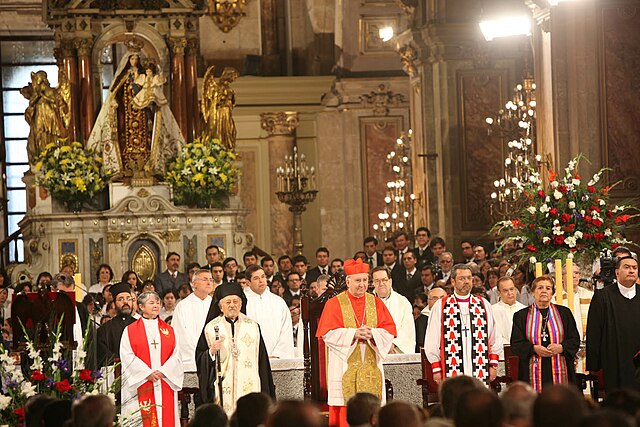Ecumenism – also called interdenominationalism, or ecumenicalism – is the concept and principle that Christians who belong to different Christian denominations should work together to develop closer relationships among their churches and promote Christian unity. The adjective ecumenical is thus applied to any non-denominational initiative that encourages greater cooperation and union among Christian denominations and churches.
Ecumenism symbol from a plaque in St. Anne's Church, Augsburg, Germany. It shows Christianity as a boat at sea with the cross serving as the mast.
Te Deum Ecuménico 2009 in the Santiago Metropolitan Cathedral, Chile. An ecumenical gathering of clergy from different denominations.
The consecration of Reginald Heber Weller as an Anglican bishop at the Cathedral of St. Paul the Apostle in the Protestant Episcopal Diocese of Fond du Lac, with the Rt. Rev. Anthony Kozlowski of the Polish National Catholic Church and the Patriarch Tikhon of Moscow (along with his chaplains John Kochurov, and Fr. Sebastian Dabovich) of the Russian Orthodox Church present
Bishop John M. Quinn of the Roman Catholic Diocese of Winona and Bishop Steven Delzer of Evangelical Lutheran Southeastern Minnesota Synod leading a Reformation Day service in 2017
A Christian denomination is a distinct religious body within Christianity that comprises all church congregations of the same kind, identifiable by traits such as a name, particular history, organization, leadership, theological doctrine, worship style and, sometimes, a founder. It is a secular and neutral term, generally used to denote any established Christian church. Unlike a cult or sect, a denomination is usually seen as part of the Christian religious mainstream. Most Christian denominations refer to themselves as churches, whereas some newer ones tend to interchangeably use the terms churches, assemblies, fellowships, etc. Divisions between one group and another are defined by authority and doctrine; issues such as the nature of Jesus, the authority of apostolic succession, biblical hermeneutics, theology, ecclesiology, eschatology, and papal primacy may separate one denomination from another. Groups of denominations—often sharing broadly similar beliefs, practices, and historical ties—are sometimes known as "branches of Christianity". These branches differ in many ways, especially through differences in practices and belief.

The front door of All Saints' Church in Wittenberg, Germany, where Martin Luther nailed his Ninety-five Theses on 31st October 1517, sparking the Reformation
A 6th-century Nestorian church, St. John the Arab, in the Assyrian village of Geramon






